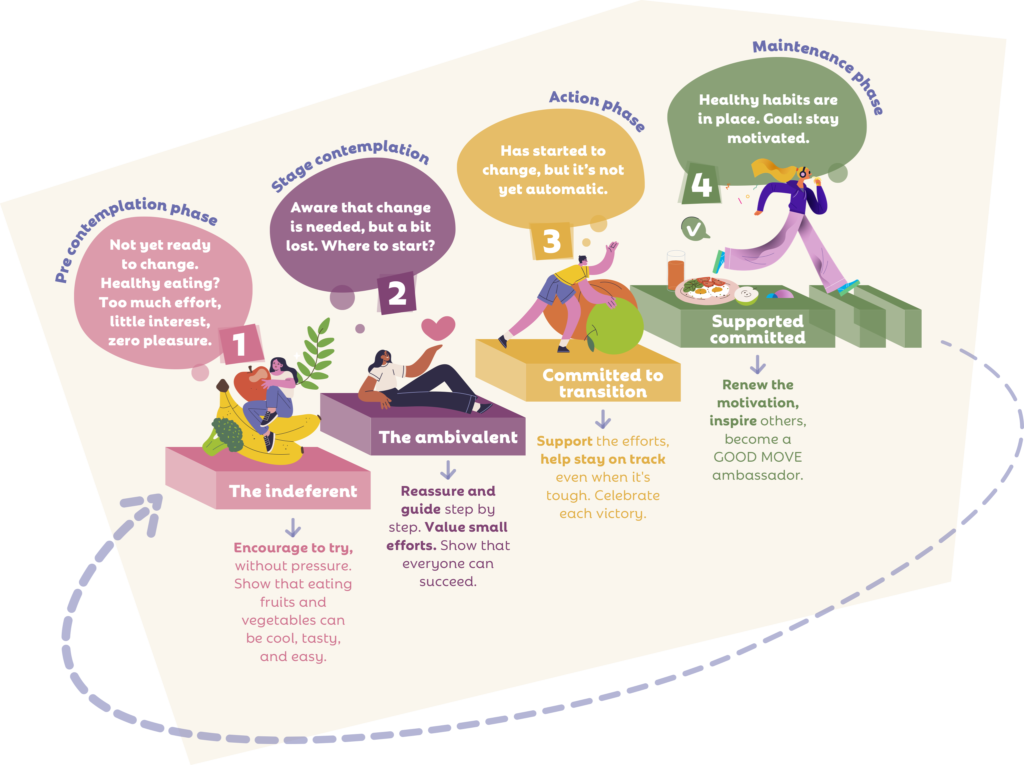GOOD MOVE from Europe,
Snack some good habits !

GOOD MOVE, a campaign that gets 18-34 year-olds moving!
Supported by Aprifel, Fruit union, Ailimpo
Health is at the heart of the concerns of Generation Z and millennials. They are increasingly aware that a more balanced diet and regular physical activity are essential pillars of well-being. But the figures speak for themselves, and too few of them still practice healthy habits in their daily lives. APRIFEL (France),FRUIT UNION (Poland) and AILIMPO (Spain) with the help of the European Union, have joined forces to remedy this situation.
The main aim of the “GOOD MOVE” program is to increase the share of fresh fruits and vegetables in the consumption habits of 18-34 year-olds in Europe, while making them more active and less sedentary.
A Strategy Based on Behavioral Science
The GOOD MOVE program is built on a scientific approach to behavior change, drawing on the theory of small steps and the Transtheoretical Model developed by Prochaska and Di Clemente (1982). This model, rooted in behavioral psychology, identifies several key stages in the process of change: precontemplation, contemplation, preparation, action, and maintenance. It is widely used to support individuals in making lasting changes, particularly in the areas of health and dietary behavior.
In this approach, every small step forward is valued: change does not happen instantly, but progressively. Sustainable transformation requires accepting one’s own pace and recognizing efforts—even small ones.
That’s why we have embedded this principle into the program. “GOOD MOVE” is not an injunction, it’s about making your own choices. The baseline is all about self-improvement, not perfection. It’s an invitation to a better way, not a perfect way, a journey to be a better self, because every step matters.
To address the program’s key messages effectively, we have segmented the 18–34 age group into four subgroups, each corresponding to a different stage of motivation when it comes to improving their fruit and vegetable consumption and physical activity:
- The indifferent to change: They are not yet aware of the importance of a balanced diet and active lifestyle and are not open to change.
- The ambivalent: They have realized the importance of changing their habits but don’t know how to take action.
- The transitioning engaged: They have started improving their habits but may face obstacles and easily fall back into old routines.
- The sustained engaged: They have successfully adopted healthy habits in a lasting way and are focused on maintaining balance and avoiding relapse.
The goal is to offer each of these subgroups tailored messages and communication channels that match their level of motivation, guiding them step by step toward healthier habits—without guilt or pressure.

This approach creates a realistic and accessible path to progress, where every step counts, and well-being is built gradually, at one’s own pace.
Discover our entities
We are all committed to implementing initiatives in our three countries to support this ambition, in line with the European vision, particularly Regulation 1924/2006 on the use of nutritional and health claims for the general public, as well as national recommendations.
-

France
Supported by Aprifel, Professional Agency for fruit and vegetable research and information, whose main mission is to analyze and communicate knowledge on the links between fruit and vegetables and health, food safety and sustainability.
-

Poland
Supported by Fruit Union, the association of Polish fruit and vegetable distributors
-

Spain
Supported by Ailimpo,Spanish Lemon and Grapefruit Interbranch Organisation




